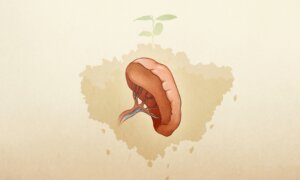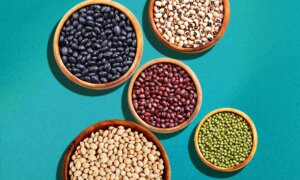A survey in Japan found that most centenarians regularly included 10 specific foods in their diets. While most of these foods are well-known superfoods, a few might appear unhealthy based on modern dietary science, which often labels certain ingredients or preparation methods as less than ideal. However, nutritionists tend to agree that the key lies in the proper combination of foods, which can offer the best health benefits.
The Japanese television program “What’s the Difference?” interviewed 300 Japanese centenarians about what they eat most often in their daily meals. The program found that the 10 most commonly eaten foods are:
- Pork
- Yogurt
- Tofu
- Mackerel
- Broccoli
- Chicken
- Natto (fermented soybeans)
- Salmon
- Salted Prunes
- Tomato
While foods such as natto, salmon, mackerel, chicken, tofu, yogurt, and tomato are very much in line with the “Mediterranean diet” or “Deshu diet” recommended by medical professionals, it is surprising that pork and salted prunes made the list.
The interview team also asked centenarians what dishes they eat most often. Nutritionists have found that, in combination, the dishes that long-living older people eat frequently are healthy and nutritious.
Frequently Eaten Food Combinations
1. Pork and Sweet Potato
Benefits of pork
- High-quality protein—prevents muscle loss
- Coenzyme Q10—a mitochondrial nutrient
- Iron—prevents anemia
- Zinc—aids in wound healing and improves immunity
Some might think that pork, as a “red meat,” isn’t healthy, but a
study by the University of California San Francisco found that red meat and white meat did not significantly differ in their effects on human blood cholesterol levels.
Another study, published in Nature Medicine in October 2022, found that while there was a weak association between eating unprocessed red meat and colorectal cancer, breast cancer, Type 2 diabetes, and ischemic heart disease, there was no evidence of an association between unprocessed red meat and ischemic or hemorrhagic stroke.
Huang Yi-ling, a Taiwanese nutritionist, said that pork contains a variety of nutrients such as coenzyme Q10, iron, zinc, and protein. She recommended choosing lean pork and eating as little fat as possible to reduce saturated fat intake.
Benefits of Sweet Potato
- Dietary fiber—reduces intestinal absorption of saturated fat
- Beta-carotene, flavonoids, and polyphenols—antioxidants
Sweet potatoes are rich in dietary fiber, beta-carotene, iron, magnesium, and other trace elements and contain a variety of essential amino acids.
Studies have found that sweet potatoes can improve blood sugar and blood pressure, protect the liver, and prevent constipation.
Huang said that the combination of pork and sweet potato is highly healthy. Pork contains more saturated fatty acids, while sweet potatoes are rich in water-soluble fiber. When entering the intestine, water-soluble fiber adheres to the intestinal mucosa and slows the absorption of cholesterol or saturated fat.
2. Salted Prunes and Kelp Sprouts
Benefits of Salted Prunes
- Helps digestion and increases appetite.
Many people think that salted prunes are processed foods with high salt content, which can increase the risk of cardiovascular disease.
Huang noted that the choice of salted prunes indicates the likelihood of some older people losing taste and appetite. Salty and sour foods can stimulate appetite and thus increase food intake.
Prunes have a number of positive effects. They can stimulate gastric acid secretion and help protein digestion. Studies have also shown that a variety of plant compounds in prunes have antioxidant and anti-osteoporosis effects.
Huang said that when eating salted prunes, it is important to control the amount, eating just one at a time to avoid excessive salt.
Benefits of Kelp Sprouts
- Water-soluble dietary fiber—lowers bad cholesterol, controls blood sugar, and promotes the growth of good intestinal bacteria
- Iodine—maintains thyroid function
Huang said that kelp sprouts are a reliable source of water-soluble fiber. In addition, kelp sprouts also contain iodine, the core mineral in the synthesis of thyroxine. Thyroid hormones regulate the body’s metabolism and maintain normal body operations, including body temperature, heartbeat, etc. Adequate intake of iodine is conducive to maintaining better thyroid function, which makes one feel more energetic.
3. Fish and Broccoli
One 101-year-old patient interviewed said that her doctors had been surprised to learn, when they examined her, that her blood vessels were healthy. She said she eats salmon four days a week, and her favorite recipe is “Japanese-style stewed salmon and broccoli in cream.”
Benefits of Fish
Huang said that fish is a good source of protein for older people because it is easier to swallow because of its relatively short fibers and soft texture. Protein supplementation is especially important for older people, as it preserves muscle mass and maintains mobility. Salmon is also a reliable source of fish oil and is rich in Omega-3 unsaturated fatty acids. Research has found that regular intake of Omega-3 fatty acids can prevent Alzheimer’s disease.
The American Heart Association recommends eating fish, especially fatty fish such as mackerel and salmon, at least twice a week. A large body of evidence from research has shown that consuming non-fried seafood such as fish one to two times a week brings benefits to cardiovascular health and can reduce the risk of cardiac death, coronary heart disease, and ischemic stroke.
Benefits of Broccoli
The nutritional value of broccoli is second to none and is rich in antioxidants such as vitamin C and sulforaphane. Studies have found that sulforaphane helps prevent strokes by preventing platelets and dissolving blood clots without increasing the risk of bleeding.
The most well-known anti-cancer property of broccoli comes from the indole substances it contains. A study published in Science in 2019 reported that indole-3-carbinol, found in cruciferous vegetables such as broccoli, can reactivate the vitality of the tumor suppressor PTEN protein, thus helping inhibit cancer cell growth.
4. Grilled Mackerel and Apple Paste
Another older woman interviewed said her secret to longevity is eating grilled mackerel and apple paste. She also said she likes to add apple paste to other side dishes. Huang said that, like salmon, mackerel is a good source of fish oil and high-quality protein. Apples are rich in antioxidant nutrients such as quercetin and pectin, which can help regulate cholesterol, improve cardiovascular health, and prevent brain neurodegeneration.
According to Huang, the above combinations share a similar characteristic in that they are rich in high-quality protein and dietary fiber, essential for a balanced diet.
5. Yogurt and Honey and Onion
One older man interviewed said he eats yogurt and onions drizzled with honey in the morning and has not had a cold in many years. Huang said that the intestinal probiotics in yogurt help adjust immunity. Aging and vulnerability to disease are related to our intestinal flora, so it is particularly important to replenish beneficial bacteria. Honey is a better source of sugar than fructose and white sugar and contains trace elements and enzymes. Huang eats yogurt mixed with honey and a little olive oil or flaxseed oil.
Research from the University of Illinois Urbana-Champaign found that adding honey to yogurt can help enrich probiotics in the body and increase the survival rate of probiotics, thus supporting intestinal health.

<span style="font-weight: 400;">Honey promotes the growth of probiotic bacteria. (BlkG/Shutterstock)</span>.
Onions have antibacterial and antiviral effects and can strengthen immunity. Huang said eating onions and honey together may not be best for everyone’s digestion. If not, you can eat yogurt with honey or soak onions in honey water for Japanese-style cold onions.
Avoid Overeating and Excessive Fasting
In addition to the type of food you eat, the size of each portion and the time between meals are also important. Huang said that many people have unhealthy eating habits. Either they overeat, which puts a heavy burden on their gastrointestinal tracts, or they fast for a long time as one way to lose weight.
She pointed out that light or intermittent fasting can regulate immunity, enhance autophagy, and help body metabolism. However, if overdone, bile can accumulate in the gallbladder, increasing the chance of developing gallstones. Moreover, not everyone’s physique is fit for light fasting. For example, people who are prone to hypoglycemia, dizziness, headaches, or trembling hands and feet should not fast.
Critical Points of Aging: 44 and 60
A
study published in Nature Aging in August revealed that humans do not age slowly and steadily over time but undergo drastic changes at the ages of 44 and 60.
The study, led by the Stanford University School of Medicine, evaluated molecular and microbial data from 108 U.S. citizens aged 25 to 75 and found periods of rapid aging twice in their lifetimes.
At about age 44, significant changes occur in the ability to metabolize alcohol and lipids associated with cardiovascular disease. A second wave of changes occurs at 60, with dramatic shifts in molecules involved in immune regulation, carbohydrate metabolization, and kidney function.
Adopt a Healthy Diet at 40 to Prolong Life by 10 Years
Shifting to a healthier diet and lifestyle at the age of 40 will play a role in extending your life. A
study published in Nature Food in 2023 showed that when people switched from the least healthy dietary patterns to ones of longevity starting at 40, they had an increase in life expectancy of approximately 10 years. Moreover, people who changed their nutritional patterns at age 70 also extended their life expectancy by about five years.



















